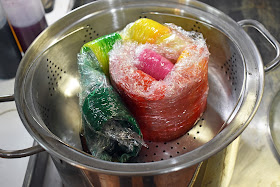Now, I am not an expert. But I hand dyed some self striping sock yarn, and I'm really pleased with how it turned out!
So, I figured I'd share what I did with you all.
Materials:
Wool yarn. I used superwash sock yarn, which is less likely to felt.
Jacquard acid dyes
vinegar
water
cotton crochet thread for ties
Dawn dish soap for washing afterwards
Tools:
saran wrap
squirt bottles
measuring spoon
gloves
dust mask
warping mill (or something to measure out your yarn)
swift (Or someone to hold the hank of yarn out for you in their hands.)
ball winder (Optional. You can ball up the yarn by hand.)
scissors
steamer
tub for soaking
Note: Do not use any of the items used for dyeing for food preparation ever again.
So, the first thing I did was to wind the hank of yarn from the swift onto my warping mill. I figured that 5 yards on the mill would give me about a 10 yard repeat (as the yarn goes back and forth from end to end.) My calculations were that that length would give me about an inch pattern repeat in my socks. You'll have to swatch for your own tension and row size to get your own figures.
I tied loose figure 8 ties every yard, from some cotton crochet thread. That helps keep things from tangling, and the cotton doesn't dye so I can find it easily later on. Don't tie these too tight, or they will block the dye from getting through to the yarn.
I also used loose ties around each arm of the figure 8 crosses at the ends of the warping mill. This again keeps things in order, and makes it easier to replace the yarn back onto the mill when the dyeing process is done.
Then I chained the yarn up as I took it off the warping mill. No tangles!
I soaked the chained up yarn in a tub of water and vinegar for half an hour. I had about a cup of vinegar in here. This provides the acid for the acid dyes to bond to the fiber.
While the yarn was soaking, I put down a layer of cling wrap onto my work surface.
Then, I chose my colors. My client wanted green, yellow, orange, and pink, as bright as possible.
At this point, I put on my dust mask and gloves. Then I put about a half tsp of dye into each squirt bottle, and mixed it with warm water. Once the dye powders were closed up and put back away, and my area cleaned up, I could take the dust mask back off. I don't want airborne particles in my lungs!!
I squeezed the water gently out of my yarn, and laid it out onto my work surface.
Then, I had fun with the squeeze bottles! I used my gloved fingers to squish the dye down into the yarn, to make sure it got all of the way through. A bit of color theory helped here. I wanted bright colors, and I know that colors across the color wheel from each other combine to make earth tones. So, I kept the green and pink/orange far away from each other.
After dyeing, I covered everything with another layer of saran wrap.
Then, I rolled the bundle up.
I curled the long bundle around itself, and put it in my steamer. I steamed the packet of yarn for an hour, then let it cool overnight. The next morning, I rinsed the yarn in the sink with first a squirt of dish soap, and then plain water to rinse the soap out. You are looking to rinse until the water runs clear. It didn't take long at all this time. Then, I hung the yarn up to air dry. (I forgot to take pictures of the rinsing and drying process.)
Once the yarn was dry, I put it back onto the warping mill, and used my automatic ball winder to put the yarn into a useable form.
All ready to go!
It worked!!! I cranked out a pair of socks on my 100 year old sock knitting machine, and just danced in my seat the whole time. I am really, really pleased with how it turned out!

















Is this a continuous loop? It looks like individual strands; how would you do this w/o a warping board?
ReplyDeleteYes, it is a continuous loop. The yarn loops around two pegs at either end in a figure 8, which keeps the threads in order for me. You are just looking for some way to stretch the yarn out. I have used wood clamps set at a distance on table tops, and walked back and forth between them, looping the yarn around the part sticking up.
ReplyDeletewow, great job!!!
ReplyDelete